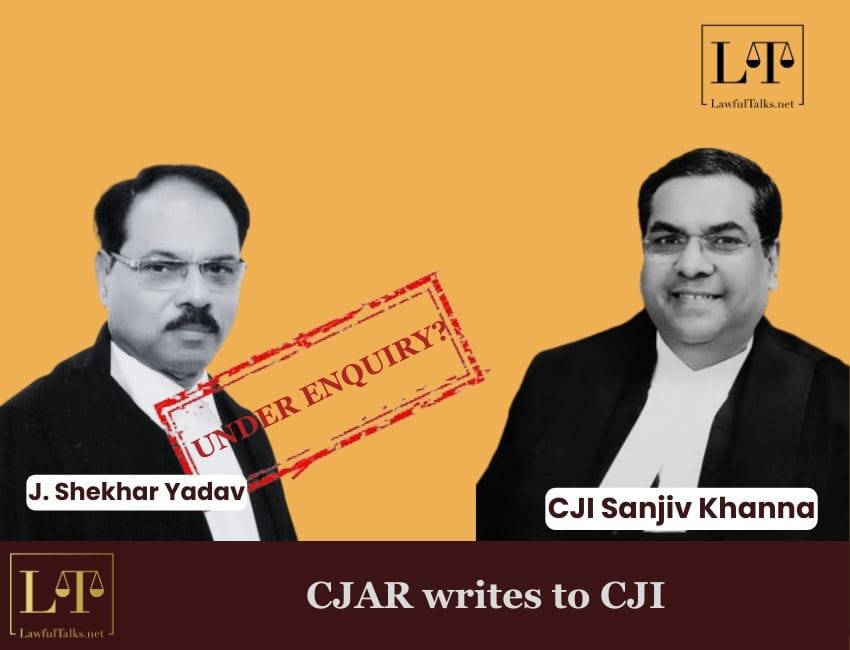Allahabad HC Sets Aside Afzal Ansari's Conviction, Allows Him to Continue as MP

The Campaign for Judicial Accountability and Reforms (CJAR) has formally requested an “in-house enquiry” into the conduct of Justice Shekhar Kumar Yadav of the Allahabad High Court following his controversial speech in an event organized by the Vishwa Hindu Parishad (VHP) on December 8, 2024. In a letter addressed to Chief Justice of India Sanjiv Khanna, CJAR criticized Justice Yadav’s speech at the event for being communal and discriminatory.

CJAR alleges that Justice Yadav violated his judicial oath and the code of conduct for judges by delivering a speech that not only praised majoritarianism but also targeted the Muslim community with remarks deemed inappropriate. The organization has called for the immediate suspension of Justice Yadav’s judicial work and the formation of a committee to investigate the allegations.
Justice Yadav’s speech, which was delivered during the VHP’s provincial convention held within the premises of the Allahabad High Court, has drawn sharp criticism for its communal undertones. Among his statements, he said, “I have no hesitation in saying that this is Hindustan, this country will function as per the wishes of the bahusankhaya (majority) living in Hindustan. This is the law...” He further added, “The law, in fact, works according to the majority. Look at it in the context of family or society... Only what benefits the welfare and happiness of the majority will be accepted.”
Justice Yadav also reportedly made comments targeting Muslim cultural and religious practices. Referring to animal slaughter, he remarked, Children in one community are taught the values of kindness and non-violence, and its people are raised to be tolerant. However, in another community, it would be difficult to expect tolerance from children, especially when they witness the slaughter of animals in front of them.
On the topic of the Uniform Civil Code (UCC), Justice Yadav expressed strong support, stating, “This country has one constitution and one set of penal laws. It is only logical that civil laws should also be unified. I am taking an oath that this country will definitely bring a single law, and it will bring it very soon.”
The speech also included statements praising Hindu culture and traditions, with Justice Yadav claiming, “Where the cow, the Gita, and the Ganga define the culture, where every home has an idol of Harbala Devi, and every child is Ram—such is my country.”
In his speech, Justice Yadav compared the reformation of practices within Hinduism to the continued prevalence of certain practices within Islam. He questioned as to why practices such as Untouchability, Sati, and Jauhar were abolished within Hinduism, yet the Muslim community continues to permit the practice of having multiple wives? He further criticized practices like Triple Talaq and Halala, claiming that they were discriminatory and unconstitutional.
A woman will receive maintenance, bigamy will not be allowed, and a man will have only one wife, not four. If one sister receives maintenance and the other does not, then that creates discrimination, which is against the Constitution, he remarked.
Justice Yadav also stated, it is not necessary for Muslims to marry by taking seven rounds around the fire, bathe in the Ganga, or apply chandan, but they should respect the culture, great personalities, and deities of this land.
CJAR has strongly condemned Justice Yadav’s remarks, arguing that they amount to judicial impropriety and a breach of constitutional values. The organization emphasized that his participation in the VHP event itself raised concerns about the judiciary’s independence, as the VHP is a right-wing organization known for its majoritarian stance.
The letter from CJAR states that Justice Yadav’s comments have completely eroded faith of the general public in the integrity and impartiality of the judicial institution. It further alleges that his conduct violated the Restatement of Values of Judicial Life adopted by the Supreme Court in 1997, which mandates that judges refrain from making public statements on political or controversial matters.
In light of these allegations, CJAR has called for the immediate suspension of Justice Yadav’s judicial work and the initiation of a formal enquiry. The letter argues that his actions have undermined public confidence in the judiciary and raised questions about his ability to act impartially.
The letter concludes, “Justice Yadav’s statements betray his inability to act with fairness, impartiality, and neutrality in the discharge of his judicial functions. Therefore, we urge that, pending the completion of the in-house committee, all judicial work be withdrawn from Justice Yadav immediately.”
Justice Yadav’s remarks have sparked a broader debate about judicial accountability and the influence of personal beliefs on judicial conduct. His assertion that “the country will function as per the wishes of the majority” and his criticism of minority practices have drawn sharp criticism from legal experts and civil society organizations.





























































































































































































































































































































































































































































































































































































































































































































































